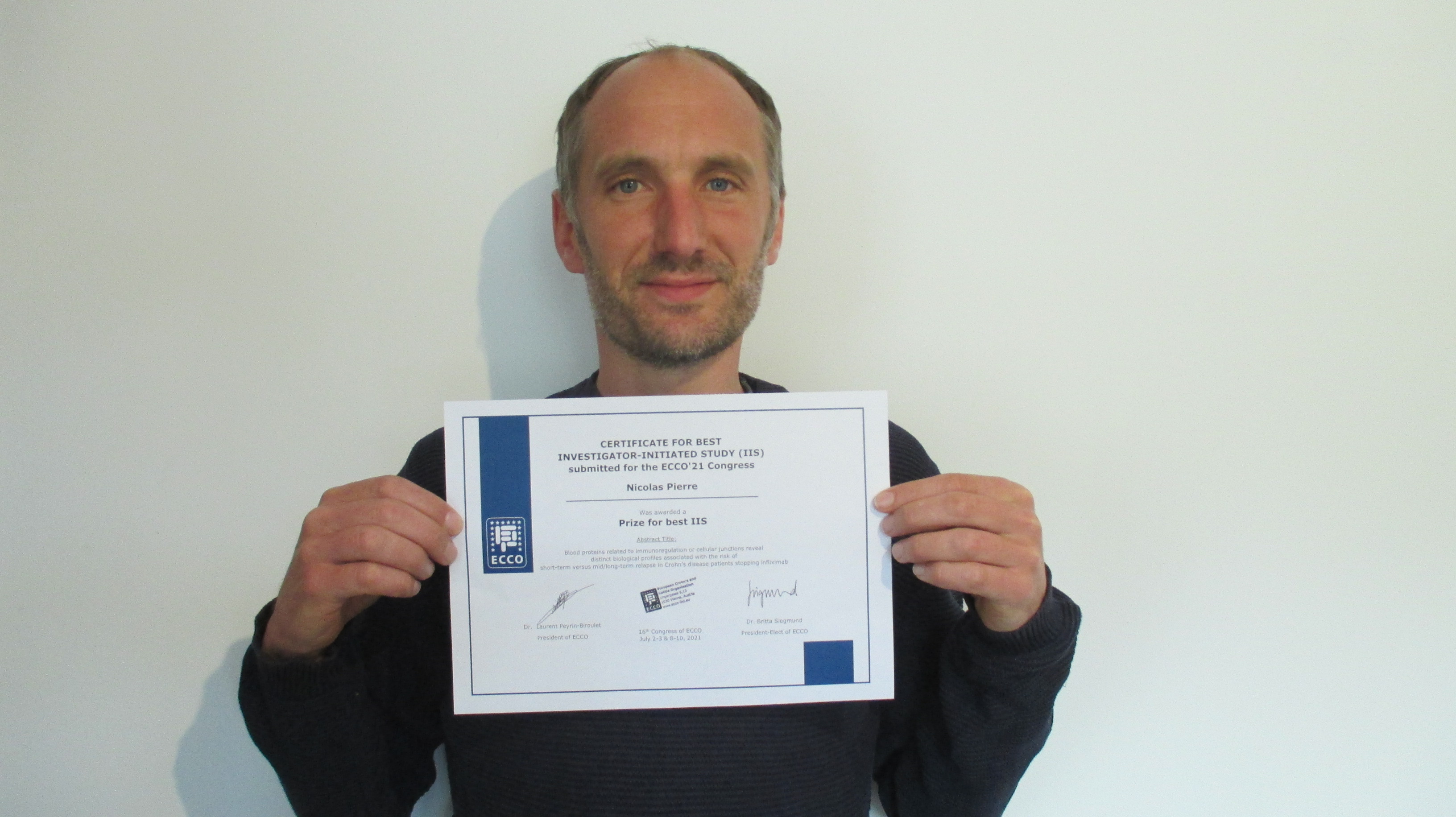Report from IIS Award Winner 2021: Nicolas Pierre
Nicolas Pierre, ECCO Member
.JPG) Nicolas Pierre © Nicolas Pierre |
Blood proteins related to immunoregulation or cellular junctions reveal distinct biological profiles associated with the risk of short-term versus mid/long-term relapse in Crohn’s Disease patients stopping infliximab
In Crohn’s Disease (CD), anti-tumour necrosis factor α (TNFα) therapy can induce mucosal healing and stable remission. When this objective is achieved, treatment de-escalation may be considered for safety, economic and patient preference purposes. Indeed, chronic exposure to anti-TNFα has been linked to serious complications (e.g. lymphoma, infections, melanoma and non-melanoma skin cancers) [1–4], and this treatment is a burden for the healthcare system [5]. On the other hand, around 50% of CD patients relapse 1–2 years after stopping anti-TNFα [6]. Thus, this strategy cannot be proposed to every patient in remission; rather, decisions should be made on an individualised basis [6].
Research on biomarkers raises hopes for the identification of patients who could stop biologics with a low risk of relapse [7]. However, the current biomarkers proposed for prediction of relapse (CRP, faecal calprotectin) offer a limited prognostic capacity and biologics withdrawal remains a delicate decision which needs greater precision [7]. Furthermore, CRP and faecal calprotectin only monitor inflammation whereas we recently highlighted various and distinct pathological processes associated with the risk of short-term (<6 months) and mid/long-term (>6 months) relapse in CD patients stopping infliximab [8]. Against this background, the aim of the present study was to further characterise these different biological profiles in order to better understand and predict relapse. To this end, we measured the abundance of 92 proteins (proximity extension assay, immune response panel, Olink, Sweden) in the baseline serum of patients (n=102) belonging to the cohort of infliximab diScon-Tinuation in Crohn’s disease patients in stable Remission on combined therapy with Immunosuppressors (STORI). This study was designed by the Groupe d’Etude Thérapeutique des Affections Inflammatoires du tube Digestif (GETAID) to identify risk factors for relapse in clinically remitted CD patients stopping infliximab [9].
Our results showed that the risk of mid/long-term relapse is associated with a low serum level of anti-inflammatory effectors (HSD11B1, IL-10, HR<1, p<0.05) while the risk of short-term relapse is associated with a high serum level of pro-inflammatory mediators (IL-6, IL12RB1, HR>1, p<0.05). The risk associated with proteins involved in the downstream signalling of cytokine receptors and pattern recognition receptors (DDX58, EDAR, IRAK1, IRAK4, IRF9, PRKCQ, TANK, TRAF2, TRIM5 and TRIM21) showed an opposite pattern in short-term (HR<1, p=0.004–0.309) versus mid/long-term (HR>1, p=0.012–0.465) relapsers. The risk of mid/long-term relapse was characterised by a high serum level of proteins mainly expressed in lymphocytes (LAG3, SH2B3, SIT1, HR>1, p<0.05), a low serum level of cellular junction proteins (CDSN, CNTNAP2, CXADR, ITGA11, HR<1, p<0.05) and a low serum level of a protein mainly expressed in antigen-presenting cells (APCs) (CLEC4G, HR<1, p<0.05). A high (CLEC4G, CLEC4C, CLEC7A, HR>1, p<0.05) or low (CLEC4A, HR<1, p<0.05) serum level of proteins mainly expressed in APCs was specifically associated with the risk of short-term relapse.
We found 1223 (short-term relapse dataset), 233 (mid/long-term relapse dataset) and 101 (non-stratified dataset) novel pairs of markers with FDR<0.05 and higher z-scores (log-rank statistic) than CRP and faecal calprotectin.
Thus, in CD patients stopping infliximab, the risk of short-term (<6 months)and the risk of mid/long-term (>6 months) relapse were associated with distinct pathophysiological processes. Previously, we came to the same conclusion by using another technology (selected reaction monitoring) and by studying other biological phenomena [8]. In addition to confirming the results of our previous study, these converging data extend the knowledge on the different biological profiles of non-relapsers, short-term relapsers and mid/long-term relapsers. As a corollary of this finding, we propose considering the biology of non-relapsers as a state of stable remission (deep biological remission) and the biology of short-term and mid/long-term relapsers as states of unstable remission characterised by different types of disease activity (residual). Thus, our findings may constitute a new step toward not only better prediction/comprehension of relapse but also better definition and monitoring of remission.
References
- Cottone M, Criscuoli V Infliximab to treat Crohn’s disease: an update. Clin Exp Gastroenterol. 2011;4:227–38.
- Burmester GR, Panaccione R, Gordon KB, McIlraith MJ, Lacerda APM. Adalimumab: long-term safety in 23 458 patients from global clinical trials in rheumatoid arthritis, juvenile idiopathic arthritis, ankylosing spondylitis, psoriatic arthritis, psoriasis and Crohn’s disease. Ann Rheum Dis. 2013;72:517–24.
- Siegel CA, Marden SM, Persing SM, Larson RJ, Sands BE. Risk of lymphoma associated with combination anti-tumor necrosis factor and immunomodulator therapy for the treatment of Crohn’s disease: a meta-analysis. Clin Gastroenterol Hepatol. 2009;7:874–81.
- Long MD, Martin CF, Pipkin CA, Herfarth HH, Sandler RS, Kappelman MD. Risk of melanoma and nonmelanoma skin cancer among patients with inflammatory bowel disease. Gastroenterology. 2012;143:390-99.e1.
- van der Valk ME, Mangen M-JJ, Leenders M, et al. Healthcare costs of inflammatory bowel disease have shifted from hospitalisation and surgery towards anti-TNFalpha therapy: results from the COIN study. Gut. 2014;63:72–9.
- Louis E. Tailoring biologic or immunomodulator treatment withdrawal in inflammatory bowel disease. Front Med. 2020;6:302.
- Chapman TP, Gomes CF, Louis E, Colombel J-F, Satsangi J. De-escalation of immunomodulator and biological therapy in inflammatory bowel disease. Lancet Gastroenterol Hepatol. 2020;5:63–79.
- Pierre N, Baiwir D, Huynh-Thu VA, et al. Discovery of biomarker candidates associated with the risk of short-term and mid/long-term relapse after infliximab withdrawal in Crohn’s patients: A proteomics-based study. Gut 2020 Oct 26. doi: 10.1136/gutjnl-2020-322100. Online ahead of print.
- Louis E, Mary J, Vernier–Massouille G, et al. Maintenance of remission among patients with Crohn’s disease on antimetabolite therapy after infliximab therapy is stopped. Gastroenterology. 2012;142:63–70.e5.
Pictures are subject to copyright © Nicolas Pierre



